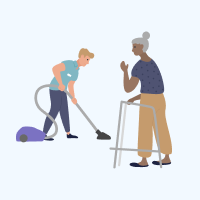Short-term restorative care is designed to help you reverse or slow the difficulties you are having with everyday tasks.
The program is delivered by a team of health professionals there to help you manage or adapt to your changing needs.
What this looks like will be different for everyone. It could involve a program of activities and exercises to improve strength and balance. It may also mean arranging access to mobility aids, a dietician to help you prepare nutritious meals, or installing minor modifications around the house such as bathroom rails.
If you wish to return to earlier levels of independence, short-term restorative care could be an option for you. It can delay the need for long-term care and support services.
What help is available?
The types of services provided through short-term restorative care will be guided by a doctor’s assessment. This will ensure your medical needs are met. Service will be selected with your input and chosen to meet your needs. Services may include, but are not limited to:
- aids and equipment (including mobility aids)
- audiology
- chiropractic services
- continence management
- cooking assistance
- home maintenance
- nursing
- nutrition, meal preparation and diet advice (dietetics)
- personal care and assistance
- physiotherapy and occupational therapy
- podiatry (foot care)
- psychologist or counsellor support
- social work
- speech therapy
- support services including cleaning or laundry, medication management, emotional support therapy groups
- transport
- accommodation in residential care
How does it work?
Your short-term restorative care provider will work with you to identify your goals. They will then put together a team of health professionals to help you work toward them, including a doctor to treat any medical conditions.
Your family and friends are encouraged to be involved in your care. The program works best when you have the support of family, friends, and health professionals.
Where is it provided?
Your care can be provided in a variety of locations. You can receive short-term restorative care in your home, out in the community, in an aged care home, or in a mix of all these locations.
For example, it may involve some work around your house to fix a trip hazard plus a visit to a physiotherapist in the community.
How long is the program?
You can receive short-term restorative care for periods up to eight weeks, twice in any 12-month period.
What will it cost me?
If you can afford to do so, you will be expected to contribute to the cost of your care and services. You do not have to complete a means assessment to access the program.
The costs you pay may vary depending on the type and level of care and services you will receive. The maximum amount you may be asked to pay is:
- $13.14 per day if you receive care while at home or in the community (17.5% of the single age pension).
- $63.82 per day if you receive care while in a residential setting (85% of the single age pension).
These costs are indexed to the age pension and updated twice a year.
If you move between settings during your care, where you stay overnight will determine the rate you will pay.

Am I eligible?
You may be eligible for short-term restorative care if you are an older person who wants to stay independent, out of long-term ongoing care but:
- needs help with everyday tasks
- is slowing down mentally, or physically or both, for example:
- your walking speed has slowed greatly
- you have trouble holding or gripping objects
- you are doing ‘less’, either physically or mentally
- you have increased levels of exhaustion
- you have experienced unintended weight loss
Check if you meet the requirements for an assessment or if you are ready, apply for an assessment now.
You cannot receive short-term restorative care if:
- you live permanently in an aged care home, or
- you receive a Home Care Package, or
- you are receiving transition care after some time in hospital, or
- you have needs that go beyond what can be met by the program.
You can still access the program if you receive support from:
- veteran services
- the Commonwealth Home Support Programme (CHSP).
If you access both short-term restorative care and CHSP services, they must provide different and complementary services.



